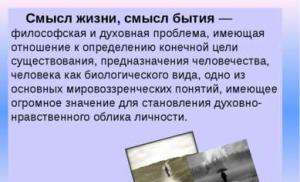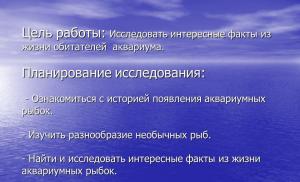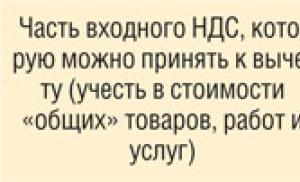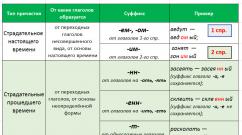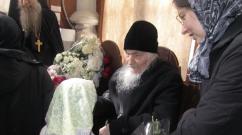Everyone, to the extent of his understanding, thinks that he is working for himself, for his own idea, and to the extent of his misunderstanding, he is working for someone who knows and understands more. Measure of understanding and institutions of power in society State and development opportunities
Ideas (concepts) and groups of people who, analyzing the historical past to the greatest depth, choose the management concept that ensures the highest stability of development in terms of predictability. It is autocratic (autocratic) and is the highest level of the hierarchy of power in society. Its main principle:
Everyone, to the extent of his understanding of the general course of things, works for himself, and to the extent of misunderstanding, for the one who understands more.
The term “conceptual power” has two meanings:
- firstly, this is the personal power of people who are able to develop a concept for organizing the life of society and introduce it into the real process of public self-government;
- secondly, this is the power of the concept itself over society, not determined by the personalities of certain people.
If people are necessary for conceptual dominion personal qualities do not possess, then they are conceptually powerless - they are hostages of conceptual power in both senses of the term. It is for this reason that in a society of conceptually powerless people neither democracy nor human rights are possible.
2. Ideological power represented by people who convey the concept of management to society in stereotypes (images) understandable to society.
Ideological power is conceptually powerless, since it only adapts the concept to specific historical circumstances and is not capable of developing the concept.
3. Legislative branch puts the concept into strict legal forms.
Any legislation is created under a certain concept, generated and implemented by the bearers of conceptual power. Accordingly, the following components can be distinguished in the legislation of any society:
- ensuring normal management according to the concept that dominates society;
- resolution of private management conflicts within the framework of the dominant concept;
- protection of management according to the dominant concept from manifestations in this society of concepts that are incompatible with the dominant one;
- “legal noise” is administratively meaningless laws, which, depending on the circumstances, can be either useful or harmful to society, and for the most part serve to feed lawyers on the basis of the principle “the law is a drawbar: where you turn, that’s where it comes out.”
4. Executive branch implements the concept structurally and non-structurally, relying on social traditions and legislation.
5. Investigative and judicial power- monitors compliance with “legality” in the life of society.
Of the 5 types of power, only conceptual power is independent. The remaining types of power are not independent due to the fact that management in them is not carried out according to the full management function, that is, the first 2 (and possibly 3) points of the PFU are missing - they receive information from the outside that is already distorted, and on the basis of this false information they undertake false actions, creating a false reality. For example, in Russian Federation there are courts and a legislative system, but everyone understands that
Let us also note this:. Ben-Gurion's goal was to gather 4 million Jews in Israel from 1951 to 1961, but 800,000 of them arrived.
In the 60s, immigration did not exceed 30,000 Jews per year.
In 1975-76, emigration from Israel exceeded immigration. Only great persecutions, as in Romania, gave some impetus to the “return”.
To force Jews to move to Palestine, the Zionists used any methods. For example, take Iraq. Jewish community (110,000 people in 1943) deeply rooted in this country.
Then in 1950 Israeli terrorist attacks began in Baghdad. Because Iraqi Jews were slow to sign up for immigration to Israel, the Israeli secret services began using bombs against them to “convince” the Jews that they were in danger. The explosion at the Shem Tov synagogue killed three and injured dozens. Thus began the exodus called “Operation Ali Baba.”
After the creation of Israel, Hitler's "innocent victims" began to behave towards the Arabs no better than the Germans behaved towards them, the Jews. They started by spitting on the UN resolution of November 29, 1947 on the creation of TWO states on the territory of Palestine. By that time, Jews made up 32% of the population of Palestine and owned 5.6% of the land. They received 56% of the territories with the most fertile lands. In just 3 months (from December 1947 to February 1948), the Jews organized more than 2 thousand armed attacks on Arab villages.
The Arabs refused to agree with this course of affairs, and the leaders of Israel seized new territories. And already in 1949 Zionists controlled 80% of the country, and 770,000 Palestinians were expelled. The most striking example is the village of Deir Yassin. On April 9, 1948, Jews from the Irgun detachment", which was headed by Menachem Begin, killed 254 residents of this village (everyone was slaughtered, including infants). By the way, today "Igrun" operates quite legally on the territory of Russia.
In order to erase even the memory of the existence of the Palestinian peasantry and give credibility to the myth of the “desert land,” all houses, fences and even cemeteries in Arab villages were destroyed.
Professor Israel Shahak gave a district-by-district list in 1975 of 385 Arab villages that had been bulldozed, out of 475 that existed in 1948. To make it appear as if Palestine was a “desert” before Israel, hundreds of villages were razed to the ground, along with houses, fences and cemeteries. There is no need to talk about Lebanon in 1982. Ariel Sharon and the same Menachem Begin are primarily responsible for the murder of 20,000 people.
In general, the mood of Israel was summarized by Moshe Dayan, the then Israeli Minister of Defense: “If we have the Bible and if we consider ourselves the people of the Bible, we must also own the biblical lands, the lands of the Judges and Patriarchs, Jerusalem, Hebron, Jericho, as well as others.” (August 10, 1967).
TENTH. Grigory Klimov in his book “Protocols of the Soviet Sages” voices the version about Hitler’s quarter-Jewishness, supplementing it with the fact that in general the entire top of the Third Reich consisted of Jews or half-breeds (except for Goering). Of course, this is one extreme, not confirmed by anything.
And then Henneke Kardel’s book “Adolf Hitler” caught my eye- Founder of Israel. She makes you think. Indeed, there were many Jews in the Third Reich. Not all of them, of course. And maybe not half. But they were. Take, for example, Adolf Eichmann, the central specialist in the “universal solution of the Jewish question.” He visited Palestine before World War II. His life's work was the expulsion of Jews, first from Germany and then from Europe. The whole humor lies in the fact that he himself is 100 percent Jewish, although he passes everywhere like an Austrian.
What was the Eichmann trial in Jerusalem? Some Jews judged another Jew. And that's all. The situation is similar with Reinhard Heydrich, chief of the Reich security service.
At the same time, there is an unconvincing version (if not a rumor) that Hitler is the grandson of the Jew Frankenberger. Werner Maser in the book "Adolf Hitler: Legends. Myth. Reality" scrupulously and meticulously examined his family tree and clearly showed that there was not a drop of Jewish blood in Hitler. He spent about 30 years on his work and no one described Hitler better than him. And for this reason alone his book is worth reading.
ELEVENTH, and the last thing. Soviet propaganda presented Hitler and his entourage as half-crazed maniacs. This is what very short-sighted writers like Mikhail Demidenko, “Following the SS to Tibet,” are doing now. This is a very clear and typical example.. The preface to this book states that the author served as a translator in China in 1949-1956, and since 1966 he has been a professional writer. He has been to China, Sri Lanka, Kampuchea, Germany, and has “unique” documents. However, he still didn’t understand anything..
He did not understand the situation in Germany either before Hitler or after Hitler.
I didn’t understand the history of World War II or Nazism in general . He understood absolutely NOTHING. And “unique” documents did not help. Despite a couple of interesting points, overall his book is miserable and a clear demonstration of how NOT to write books. But in spirit he is a typical scoop with a very narrow outlook.
After the defeat of Hitler and the capture of his comrades, the Allies appointed a group of specialists to assess the state of mind and intelligence of the leaders of the Third Reich. All of them turned out to be sane (Vladimir Istarkhov, "URB", pp. 327-328). American doctors Douglas Kelly and G. M. Gilbert used the German-language version of the Wechsler-Bellevue intelligence test. This test included:
A. Verbal tests of memory and use of concepts:
1. Memory capacity for a series of numbers of increasing length
2. Arithmetic of increasing complexity
3. Common sense questions
4. Formation of images based on verbal similarities
B. Performing tests of observation and sensory-motor coordination:
1. Staged test in which you need to replace symbols with numbers
2. Assembling objects such as puzzles
3. Converting images on colored cubes
4. Recognizing missing parts of pictures
As a result, the data was as follows (only some are given). The intelligence of all the leaders of the Third Reich turned out to be above average (90-100 points).
Phrase “Everyone, to the extent of his understanding, works not for himself, but, to the extent of misunderstanding, for those who understand more”- has become part of the commonly used set of “clichéd sayings”, since even with a superficial look at the relationships between people in society, it does not raise objections. But for the majority of those who agree with her, problems will arise if they are asked to move from a superficial look to a specific consideration those phenomena in the psyche of people and in intra-social relations, which this phrase covers.
First of all they will stand up specific questions that require specific - metrologically consistent - answers:
- What's happened measure of understanding as an objective phenomenon?
- Measure understanding what?
- Measure of what his essence of understanding?
- How to measure different in their essence understanding?
After all different people due to the specifics of their destinies and the biographies that realize destinies, they cannot understand everything identically: someone knows and understands one thing; others know it, but do not understand it; and still others do not know and do not understand this, but know and understand something else; and along with this, in every society there is something that everyone knows and understand more or less identically .
But this approach also leaves the difference in silence knowledge as such about something And understanding this in its concrete connection with everything else.
In addition, the very concepts of “less is more,” including in relation to the degree of understanding, imply the presence of a certain measured scale (linear, logarithmic, some other), with which the comparison of quantities or phenomena correlated with each other takes place. such. And accordingly, if we are in the space of many parameters, then the questions will arise: where and how to direct this kind of scale in it? and will it be straight or some kind of curved? and most importantly - in the space of what parameters and how are the different understandings that we intend to measure expressed?
Those. understanding this sociological formula requires bringing some conscious images under its lexical expression, since otherwise understanding will not be developed. And if the system of these images and the relationships between them is inadequate to Life, then understanding will also be inadequate.
However, understanding the answers to these questions, as well as those questions that may arise in the course of solving this problem on precise "drawing" images and their relationships, which together constitute figurative representations corresponding to such a generalizing concept as “measure of understanding”, also fits into the formula “Everyone, to the extent of his understanding, works for himself, and to the extent of misunderstanding, for those who understand more”.
And if you cannot solve this task of drawing and directly measuring understanding, then the question arises: how, i.e. on the basis of what objective signs can one judge indirectly, indirectly, the extent of each of the different subjective understandings?
- Moreover, the understanding is always one’s own - regardless of whether it is developed independently or with the help of someone else. As a result of this, on the one hand, it cannot be taken away from others or copied from their psyche to someone else, and on the other hand, it cannot be given to others or put into someone else’s psyche in a ready-to-use form, either at their request. , nor against their wishes.
- But along with this, it is possible to prevent other people from developing their own understanding, for which in the culture of mankind throughout the history of crowd-“elitism” many methods of dissemination have been created and used misunderstanding, i.e. inadequate Life as if understanding .
According to paragraphs 1 and 2, in this analytical note we will not “draw pictures” in which we solved for ourselves the proposed problem of considering the formula “Everyone, to the extent of understanding, works for himself, and to the extent of misunderstanding, for those who understand more.”
And more questions will arise:
- How are people’s relationships built on the basis of all this, and how does a culturally unique society appear in one way or another? organizational forms oh your life?
- How does a particular society interact on this basis with other culturally distinctive societies and make its own unique contribution to the process of globalization?
- What impact and how do these organizational forms have on what has been called the “measure of understanding”?
- What does this impact lead to: a change in the organizational forms of life of society or to its death? - and what factors influence the resolution of uncertainty “change - death”?
- Is the conflict between “your own understanding” and “the understanding of those who understand more” always inevitable?
But there cannot be an adequate answer to these questions if there is no adequate answer to a group of questions related to the sociological formula “Everyone, to the extent of his understanding, works not for himself, but, to the extent of misunderstanding, for those who understand more.”
- As has been known since ancient times, “one fool can ask so many questions that even a hundred smart people cannot answer.”
- But along with this, it has been known since ancient times that DIALECTICS IS A METHOD OF FINDING TRUTH BY ASKING GUIDING QUESTIONS.
From the correlation of paragraphs 1 and paragraph 2, you can guess that questions need to be asked, but in order not to be a fool, you need to master dialectics as a method of cognition and creativity and, on its basis, develop your understanding, improve the organization of your psyche as an information-algorithmic systems.
To do this you need:
Learn to get out of the flow using a purposeful and volitional order just seemingly obligatory and inevitable bustle of life and allocate free time in order to without being overwhelmed by fatigue, to feel Life and think independently, and not according to the authority of certain persons or the historically established traditions of a particular subculture.
Accordingly, in the materials of the Concept of Public Security, the key book is “Dialectics and atheism: two essences are incompatible,” and everything else is only a consequence of the fact that the participants in the VP of the USSR, by the beginning of their activities in such capacity, were already carriers of any kind of personal culture of knowledge based on dialectical method.
Worldview (and worldview as its component) are a finite set of information modules, each of which is characterized by:
- a boundary that distinguishes it from the background, arising due to the fact that information does not exist without a corresponding coding system, and also due to the fact that all primary information at the level of consciousness of the individual’s psyche first appears as a result of insight by Discrimination and appears as a kind of “this”, delimited with background, which can be called in the general case - “not this”;
- a system of interrelations with other information modules as part of the worldview and worldview, as well as with Life in general.
The development of a worldview and understanding of the world, the identification and correction of errors in them, the development of new knowledge and skills, in their essence represent the resolution of certain uncertainties (as well as the development of certainties) both within this subjective system of delimitation and interrelations of discrete information modules with each other, and in the system of its relationships with Life.
At the level of consciousness in the individual’s psyche, uncertainties are expressed in the form of questions, and their resolution is expressed in the form of answers to questions.
According to this circumstance, both questions and answers must be definite in their meaning and in some way mutually correspond to each other. At the same time, the levels of the psyche - consciousness and unconscious - must work in interaction with each other: the dialogue (information exchange) of consciousness and unconscious levels of the psyche must be subordinated to the meaningful will of the individual, and consciousness in this version of the organization of the psyche relies in its cognitive and creative activity on the unconscious mental levels and necessarily evaluates the results obtained, correlating in principle “practice is the criterion of truth”. In our opinion, this is how the cognitive and creative activity of an individual should be organized.
And here we come into contact with the problem of differentiation:
- dialectics as a method of consciously developing new knowledge and skills by constructing a sequence of questions defined in meaning and finding life-appropriate answers to each of them (or a network, i.e. a set of such sequences intersecting at some nodes and mutually complementing each other) ;
- logic as a method of developing new knowledge based on:
- certain initial data characterizing a certain problem,
- some axiomatics and a set of rules defining acceptable and unacceptable operations with initial data and intermediate results;
- and the so-called “devilish logic”, with the help of which in anything you can convince anyone who does not own even more sophisticated “devilish logic” or dialectics.
« LOGICS- the science of methods of proof and refutation" (“Soviet encyclopedic dictionary”, 1986). All functionally specialized varieties of logic answer the question in their own way: how to come from true judgments-premises (initial data) to true judgments-consequences (decisions, answers to questions) and differ from each other in their functional purpose, axiomatics, and a set of rules defining admissible and invalid operations on input data and intermediate results.
Logic is characterized by the conditioning of each of the subsequent judgments by judgments of previous and initial data. Moreover, all questions in the logical procedure stem from previous judgments, similar to how in the elementary grades of school everyone solved arithmetic problems question by question, moving from answering one question to answering the next question in the course of solving the problem.
The so-called “devilish logic” It differs from normal logic in all its varieties in that it is based on the following principles:
- axiomatics and rules announced at the beginning of the process of logical reasoning can be replaced by others without announcement;
- some concepts are secretly replaced by others, i.e. the same lexical (or other symbolic) forms of displaying logic at different stages of the “logical” procedure can be associated with different subjective-figurative representations and objectively different phenomena;
- under the guise of certainties, hidden uncertainties can be offered, which will subsequently lead the listener to the “devilish logic” to very definite conclusions and the impossibility of justifying other conclusions;
- the set of initial data necessary for adequate perception of the problem and its resolution can be artificially narrowed, and it can also include data that has nothing to do with the problem under consideration, but may be related to another problem, which in some cases makes it possible to impose under the guise solutions to one problem - a solution or pseudo-solution to some other problem;
- essentially “tunnel scenarios” for considering the issue may be proposed, in which the entrance and exit to known desired conclusions are predetermined, and the transition to other scenarios for considering the issue will be stopped in one way or another, etc.
The withdrawal of an individual’s thinking into “devilish logic” can be caused by:
- Or malicious intent seeking to convince someone personally or society as a whole of the truth of a deliberate lie.
- Either as a consequence of obsession, i.e. a consequence of distortion of mental activity in general (including the activity of the intellect) by the influence on the individual of egregors, other people or psychotropic substances.
One of the signs of manifestations of diabolical logic is concealment fundamentally significant for understanding the life of lies in large volumes of reliable information. So, in a number of cases (if we relate to the volume of the text or the duration of the speech), a fundamentally significant lie can be less than 1% of the total volume of the text, as a result of which the consciousness, having assessed the general meaning as reliable, is able to accept as reliable an insignificant one (according to the duration of its impact). on consciousness) detail. In other cases, fundamentally significant reliable information is accompanied by many lies accompanying it, an example of which is the Bible in its historically established form: God exists - this is a fact confirmed by Life, but the repeated proclamation of this fact in the Bible is accompanied by so many lies that the more an individual is convinced in the truth of the Bible, the more problems he has in his relationship with God in life.
DIALECTICS- not logic. Dialectics embraces logic in the sense that questions in the course of the dialectical process of cognition (and creation) and answers to them can arise from:
- from initial data and previous judgments, as is the case in logic;
- from some guesses, justified in some other way and not logically;
- “taken from the ceiling” - i.e. from not justified in any way (in logic, only axioms “have the right” to this) intuitive assumptions and a conceptually unclear feeling of not formally identified cause-and-effect relationships of various, seemingly unrelated phenomena.
Due to the last two circumstances, dialectics is an informal art, a mental skill, the possibility of mastering which is genetically inherent in a person, but which cannot be mastered formally algorithmically: do “one”, do “two”, do “three”..., - we congratulate you and give you You will receive a qualification certificate “dialectician-bachelor” (“dialectician-master”, etc. up to and including the degree of “president of the Academy of dialectics and all sciences”).
Therefore, if the art of dialectics has not been mastered, then a person asks “the wrong questions” and in the wrong sequence, and even if they are given generally correct answers corresponding to these questions, then the sequence “question - answer, question - answer, …” (or the network of “questions and answers” in some of their interconnections) turns out to be vitally untenable and does not lead to the truth.
As a result of this, dialectics lacks formalized algorithms and formal logical laws externally - formally - similar to the so-called “devilish logic”, in which laws and rules are developed, approved and canceled (including by default) along the way, according to the goals and needs, they managed the process of convincing someone of something on the basis of “devilish logic”, which makes it, in turn, similar to schizophrenia.
Unlike "devilish logic" the process of dialectical cognition and creation is essentially different and therefore leads to Truth-Truth, and not to errors and schizophrenia. This is all the more true, the more stable the individual is in the human type of mental structure: as the Sufi Al-Ghazali (1058 - 1111) noted in ancient times:
“A mixture of pig, dog, devil and saint is not a suitable basis for a mind trying to gain deep understanding, which with such a mixture it will be impossible to achieve.”
The reasons for the failure of the dialectical process of cognition (including its transition to “devilish logic”) are vicious morality, an erroneous worldview and an overall inadequate organization of the psyche.
The measure of understanding is an objective phenomenon due to the objectivity of the trinity of matter-information-measure and God's Providence.
Although many people do not think about the essence of this objective phenomenon, nevertheless, different cultures have developed different formulations of subjective assessments of the measure of understanding:
- “if you are so smart, then why are you so poor?” (or in another wording: “if you are so smart, then show me your money”) - is typical for ordinary people in many Western countries;
- “Someone (insert name) so smart: he is so courteous, he speaks about everything so easily, beautifully and confidently” - typical of the Russian liberal “anti-intelligence”;
- "Mr. Taranaga very smart: he rarely makes mistakes" - a phrase from the series “Shogun”, broadcast on Russian television in the 1990s.
These criteria also express different measures of understanding, and therefore they are not equivalent.
The most bad(in every sense of the word) is the criterion “he is so courteous, speaks about everything so easily, beautifully and confidently,” which is excessively widespread in Russia, which is why many of its troubles stem.
The criterion of the rarity of errors is, in fact, an indicator of the degree of understanding, but not in itself, but expressed in behavior - in the life and activity of every individual. This - special case a principle that knows no exceptions:
PRACTICE IS THE CRITERION OF TRUTH.
But the question about the mistakes that a person can make in life is of a two-stage nature:
- at the first stage - the choice of life path takes place;
- on the second - following the chosen path.
It is clear that if the path itself is chosen erroneously, then following it without error is an illusion of infallibility; and abandoning the wrong path is correcting the mistake, although in the understanding of other subjects enslaved by the illusion: abandoning the illusion is a mistake.
This is about the first criterion: “if you are so smart, then why are you so poor?”, which does not discuss the issue of choosing a path, i.e. the question of the objective difference between Good and Evil - both ideally and in their specific manifestations in life.
The answer to adherents of this criterion is found in Sufi tradition. Harun al-Rashid, the Caliph of Baghdad, and his vizier visited Mecca specifically to see the Sufi Fudayla, who said upon meeting:
“- Commander of the Faithful! I'm afraid that your pretty face may end up in hell.
Harun asked the sage:
Do you know anyone who has achieved greater renunciation than you?
Fudail replied:
Your renunciation is greater than mine. I can renounce the ordinary world, but you renounce something greater - eternal values.
Fudail explained to the Caliph that power over oneself is better than thousand-year-old power over others” (in the transmission of Idris Shah).
Power over yourself better than power over others, including power over others through one’s money and the purposefully created - maliciously or foolishly - lack of money of others.
An essentially similar answer to adherents of the “show your money” criterion is given in the poem “The Prophet” by M.Yu. Lermontov.
In fact, in the sociological formula “everyone to the extent of his understanding...” we are not talking about some vague understanding of who knows what, but a worldview based on a certain worldview. Worldview and its ideological basis can be classified into one of three types:
- kaleidoscope - in it there are no relationships between the components determined by these components themselves and the matrix of possibilities of being;
- I-centric mosaic, developed in the direction “from the “beloved” self - through the line at which the conscious perception of the world through the senses ceases - to the imaginary (as far as the unrestrained imagination is enough) limits of existence”;
- Divine mosaic, developed based on the concept of the trinity of matter-information-measure from the image of God - in the direction of particulars that arouse the morally conditioned interest of the subject.
In mosaics, unlike a kaleidoscope, there are relationships between the components that are determined directly by the components themselves, as well as by the matrix of possibilities of being. However, there is a fundamental difference between the types of mosaics:
- in Self-centric mosaics, the boundary between the reliably known and the creations of immense fantasy, which really have no other place in life except in the subjective imagination of certain individuals, is not defined;
- in the God-primary mosaic, this boundary can be identified and, with the possession of cognitive and creative skills, it can move in the direction of the previously unknown.
The most significant function of worldview in the psyche of an individual is that worldview is a means modeling the course of events in life in a variety of options at a pace that is ahead of the real course of events, which makes it possible to identify in advance unacceptable options for a possible future, choose acceptable ones and develop, in a sense, the best line of behavior for an individual in life.
In relation to this function, the effectiveness of the worldview and understanding of the world increases from a kaleidoscope, which has close to zero efficiency, to the maximum possible, which is possessed by the mosaics of the God-primary type of carriers of the human type of psyche structure.
The above is a necessary basis for moving on to consider how the sociological formula works in the life of society and statehood “Everyone, to the extent of his understanding, works for himself, and to the extent of misunderstanding, for those who understand more.”
Increase your understanding...Everyone thinks to the best of their ability,
that works for itself, for its own idea, but in moderation
lack of understanding for someone who knows and understands
more.
7 surprising signs
that you are truly a deep thinker...
Being a deep thinker is a great gift,
because it allows you to get to the heart of things.
7 Surprising Signs You're a Truly Deep Thinker
What do you call someone who wanders the world, collecting knowledge and experience bit by bit? Or someone who would rather remain calm than get into unnecessary arguments?
I Heart Intelligence names such people
"deep thinkers" Maybe you are one of them?
7 Characteristics of Deep Thinkers:
1. They analyze their experience.
Call it a blessing or a curse, but all great thinkers tend to wander in the realm of their own thoughts, easily avoiding gossip and trifles that interfere with their thinking. They carefully analyze events so as not to repeat mistakes. They may remember the past nostalgically, but prefer to think about the future.
2. They prefer privacy.
Deep thinkers spend most of their time alone, not needing the company of others. They tend to be introverts and often live alone. This is all because they love to process information comprehensively, and for this they need personal space and time.
3. They are natural empaths.
An introvert does not mean a soulless egoist. Deep thinkers know a lot, and often give balanced and wise advice. They tend to be empathic and emotional. They are also good listeners and delve deeply into every problem.
4. They have an unconventional view of the world.
Deep thinkers are not tied to a particular ideology, religion, or political faction. They see the world from different points of view and are able to draw a three-dimensional perspective. Observing people and their habits deepens understanding, leading to a kind of enlightenment; we tend to call it wisdom.
5. They are often forgetful.
It may seem strange, but a person lost in thought may forget to bring home milk and toilet paper. In fact, deep thinkers are so focused on their thoughts that they often forget about everyday needs.
6. They love to learn.
Learning something new allows you to develop and move forward. Deep thinkers also love to teach others because as they explain, they come across questions that need answers.
7. These are some of the most open people
that you have ever met.
Sincerity and openness are qualities of smart and courageous people. Deep thinkers are not inclined to dissemble or dodge, and their directness can be devastating.
The question is: Who would like this “cocktail” of problems as a reality in the foreseeable political future of Russian life?
But the situation will be simply a caricature if the authors reach the European Court of Human Rights and the court obliges the Russian Federation to recognize Old Testament extremism, while the rest of Europe will not be obliged to do so...
But we think that the assumptions with which we began Section 2 are not realized. And the publication in the media of a message about the initiative of the Stavropol residents is a test for “Jewish admiration” and the presence of “Jewish fear” (exorbitant jitters before the Jews) in Russian society, functionally similar to such tests of the past as the Beilis case (1911), the scandal of the perestroika times around the book A.Z. Romanenko “On the class essence of Zionism” (Lenizdat, 1986), scandal in connection with the appeal of State Duma deputies to the Prosecutor General’s Office on the topic of recognizing all religious and national associations as extremist (early 2005). Those. The purpose of this publication is to give an answer to the topic of what policy can be pursued towards Russia by the leaders of the biblical project. In the materials of the KOB, the issue of this kind of testing of society was considered several times in the past, in particular in the analytical note of 2005 “And you will look for someone to sell yourself to, but there will be no buyer for you...” (its section “Testing Society as an Instrument of Global Policy” presented in this note as Annex 2).
Notes:
And what do they teach in journalism and philology departments? - well, and the style: “application of 11 sheets.”
The Bible consists of two parts: the Old Libel against God, and the New Libel against God.
On this, see the analytical note of the VP of the USSR “Fascism is going to war against fascism: - Who sent it?” from the series “About the Current Moment” No. 1 (37), 2005
